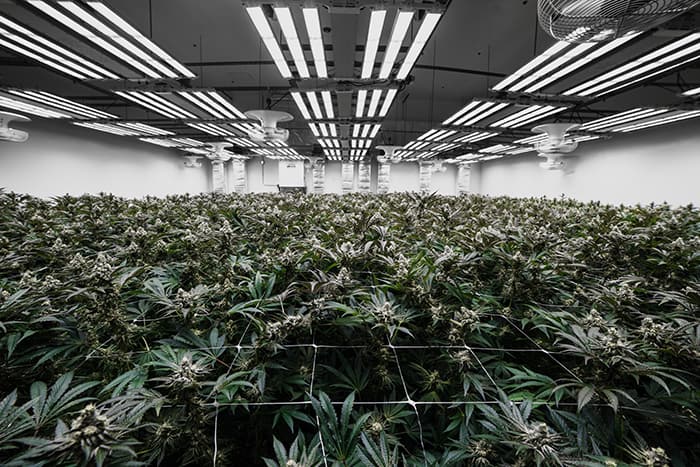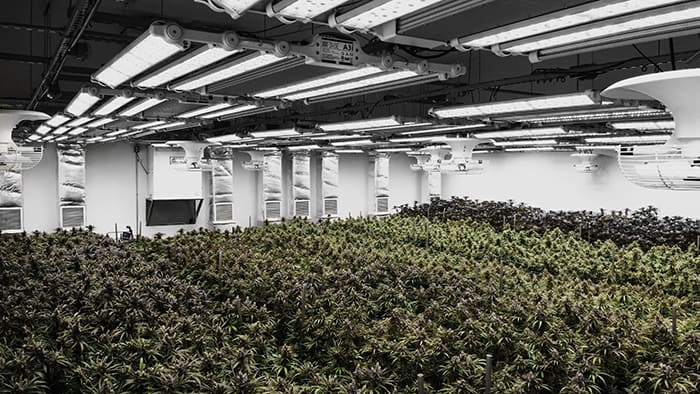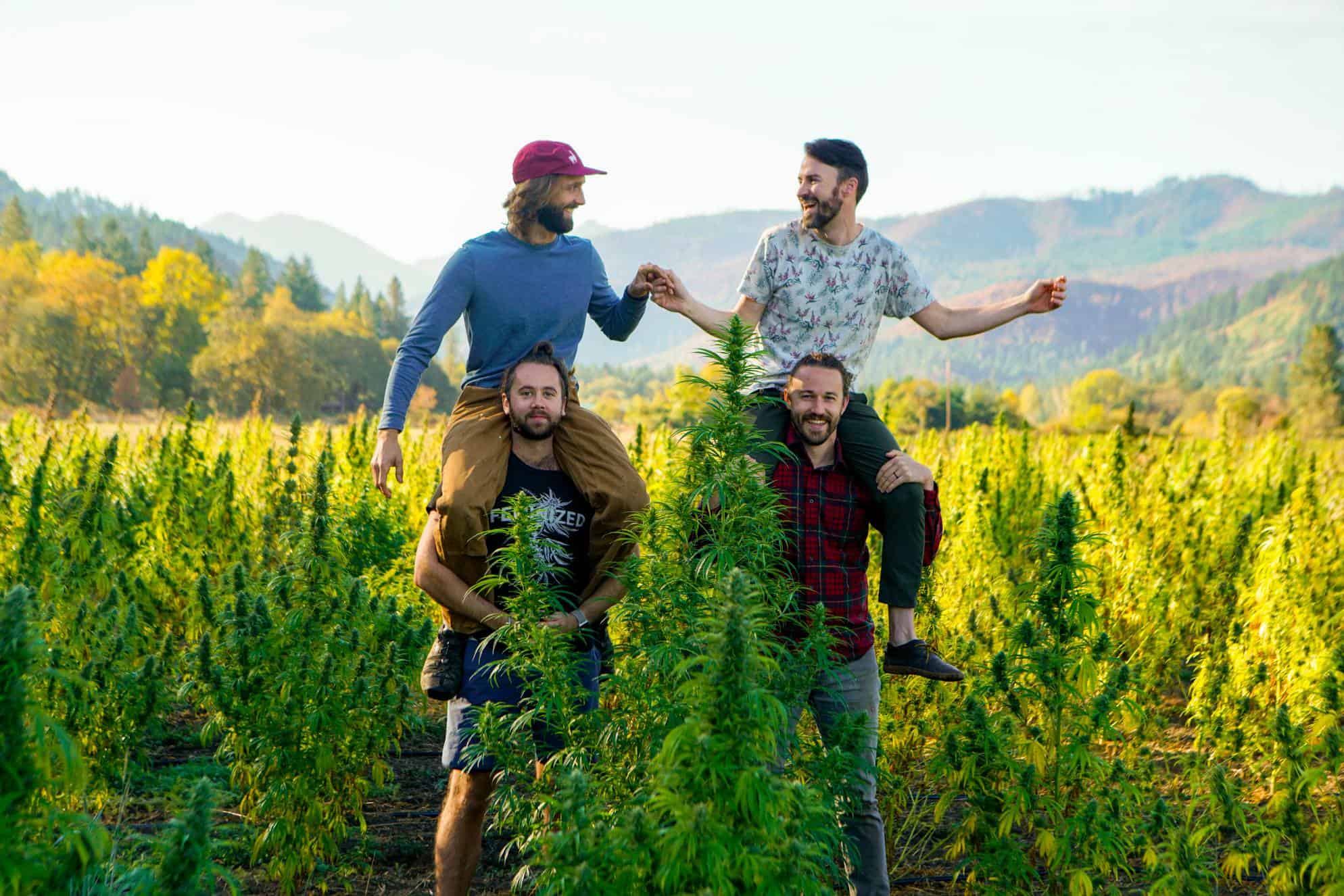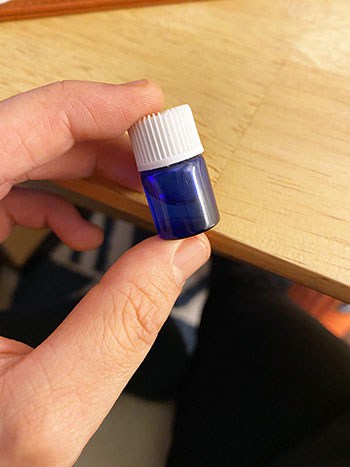When Mike Howard, director of cultivation at The Grove, first caught word of the record-breaking cannabis yields being harvested regularly by fellow grow teams around the country (Lume Cannabis in Michigan and Green Life Productions in Nevada) he knew the game was changing. Once Howard dug deeper into the news, he discovered a common catalyst behind the success of his peers: Both facilities were actively growing under the A3i LED grow light from Fohse.
After hearing firsthand from the grow teams in Michigan and Nevada how they had increased yields over HPS by 31% and 100% respectively, Howard knew he had to get Fohse lighting into The Grove—and fast!
The Grove, a vertically integrated cannabis business with dispensary, cultivation, distribution and production licenses, has been producing, sourcing and selling high quality edibles, cartridges and recreational cannabis products since 2015. Their 26,600-square-foot growing and production facility is state-of-the-art and eco-friendly. They strive to recreate the conditions that cannabis would find in nature and use only all-natural growing media and inputs as well as biological measures to control any pests or diseases. It only makes sense then that they would seek out and select Fohse products—the best lighting fixtures in the business—to match The Grove’s exacting standards.
The dry Las Vegas air makes for a challenging indoor growing environment for cannabis. Fohse fixtures operate at much cooler temperatures than standard HPS fixtures.
At The Grove, this means that the humidifiers and cooling systems don’t have to work as hard, and that an equilibrium between temperature and humidity level can be more easily achieved and maintained. This has led to some of the record harvests being seen regularly at The Grove.
Looking at how Fohse’s A3i 1500-watt fixtures compare to standard 1000-watt DE HPS fixtures in an “apples to apples” comparison reveals just how in sync these intelligent fixtures are with cannabis. The numbers from a recent, late fall harvest tell an impressive tale:
| A3i 1500W LED | 1000W DE HPS | |
| Total Fixtures | 35 | 64 |
| Total Plant Count | 520 | 520 |
| Grow Media | Coco pots | Coco pots |
| Grow Area | 1056 sf | 1056 sf |
| Flower Cycle | 65 days | 65 days |
| PPFD (early flower) | 800-820 | 800-820 |
| PPFD (late flower) | 1250-1350 | 1000-1050 |
| Wet weight | 1,392 lbs. (631.4 kg) | 716 lbs. (324.8 kg) |
| Dry Weight | 223 lbs. (101.3 kg) | 135 lbs. (61.2 k g) |
| Yield in oz./ Square Foot | 3.4 oz (96 g) | 2.05 oz (58 g) |
| Lbs. of Cannabis/Light Fixture* | 6.37 lbs. (2.98 kg) | 2.11 lbs. (.96 kg) |
| Total kWh | 41,072 | 49,155 |
*Strawberry Cheesecake was the highest-yielding strain at 7.2 lbs/light, while Cookies was the lowest at 5.49 lbs/light
In the now-typical example above from the fall of 2020, the A3i system generated an average of 27% more light as compared to the HPS fixtures. This additional light led to an increase in dry yield harvest weights by a whopping 65%. All of this, while using 16% less energy than the HPS lighting it was compared to and in the same physical footprint of space with the same number of plants.
Remarkable results like those at The Grove are not a fluke or an accident and they are not restricted to Howard and his team alone. Growers all over are finding results like these to be the new norm, regardless of growing media and style of growing.
Lume Cannabis has been tracking results of their Fohse A3i fixtures for over 40 hydroponic growing cycles and across eight different strains of cannabis. Without fail, the team at Lume under Kevin Kuethe’s direction reports higher yields under the A3i than those grown under HPS. For example, with Fohse fixtures they have harvested 7,130 lbs. versus 5,241 lbs. with the same strains grown under HPS. THC levels under Fohse lights have been 3% higher too; 20% versus 17% on average. In other words, the cannabis that Lume grew under Fohse lighting netted more than $2.5 million more than the cannabis grown under HPS.

@Keene.Media
Steve Cantwell at Green Life Productions also reports unbelievable differences since switching over to Fohse’s A3i and F1V fixtures. Green Life Production’s typical harvests under their previous lighting system clocked in at 80-90 lbs. The average harvest now using Fohse fixtures is 160 to nearly 200 lbs. pulled from their 4×8, no-till, living organic soil beds.
Like Howard’s team at The Grove, Cantwell and his team have the enviable logistics problem of figuring out where to put all of the bounty from these sky-high yields. All three teams, The Grove (coco pots), Lume Cannabis (hydroponics) and Green Life Productions (live soil), are blowing harvest records out of the water time and time again across three drastically different cultivation styles. These highly regarded and experienced cannabis producers are showing that the rules have changed and that Fohse lighting fixtures enable previously unobtainable and unthinkable results.
Howard and the grow team at The Grove have achieved their amazing results by relying on the horticultural skills of their talented team, and also by utilizing two of Fohse’s premier products. They have predominantly been using the A3i model, Fohse’s workhorse grow light, to achieve their highest yields. The A3i is specifically designed to grow cannabis and that is exactly what it does. Its spectral distribution is custom-made to address the unique needs of cannabis. As evidenced in the remarkable yields outlined in the table above, the A3i’s output (of up to 4,970 µmol/s depending on configuration) can be adjusted to supply seasonably appropriate lighting depending on the growth phase of the crop. All of this while producing up to 156% more light per fixture and burning cooler (no hotter than dishwashing water) than traditional HPS grow lights. This means the A3i is safer to operate for both growers and their cannabis crops.
The A3i system is designed to handle the harsh extremes of a growing environment. The IP67-rated fixture will continue to operate at peak performance even with the moisture, dust, pests and biological debris, such as spores that are present in most indoor growing environments. Not many growers would expect their grow lights to still perform well after being submerged under several feet of water; the A3i can survive such a plunge and be relied on to deliver its photon payload as designed. Howard and his team at The Grove do not just rely on the A3i for their high yields. In their double-stack rooms they deploy Fohse’s lighter, more nimble F1V for its pound-for-pound power.
Just like the A3i, the F1V fixtures rely on industry-proven Samsung LEDs for their photon delivery. While almost the same dimensions as the A3i, at 38 lbs. (17.2 kg) per fixture they are almost half the weight of each A3i (70 lbs./31.75kg each). Like the A3i fixtures, their power supply rating is +100,000 hours. Depending on the needs of the grower and the ability of the existing systems, Fohse offers 420W, 600W, and 800W versions of the F1V. In his own F1V rooms, Howard has reported similarly positive results as in his A3i rooms: 60%+ yield increases, increased utility efficiencies, and better labor efficiency. The team now does not have to “chase canopy” by raising and lowering the lighting fixtures to achieve late-flower PPFD intensities like they did with the old LED lights that they were using in those double-tiered systems.
Fohse lighting products outperform their competition not only at The Grove, but anywhere they have been put to the test. So why hasn’t every cannabis grower switched over to Fohse?
Growers who have not yet seen the results firsthand still believe that LEDs cannot keep up with the high lighting demands of cannabis the way that HPS lighting traditionally has. The narrative had long been one of incremental change and an acceptance that two pounds of harvested yields per light fixture was the best one could expect. At the turn of the century, there was chatter that this didn’t have to be “good enough.”

@Keene.Media
By 2015, growers both professional and amateur alike had proven that three pounds per light was achievable based on advancements up to that point, but no one thought it would ever get better than that. Until Fohse set out to prove them all wrong, and then did. They showed that higher light output does not have to mean higher heat and that Diode technology had come a long way in just a few short years. Howard gives his take on this phenomenon:
“Everyone looks at LED lighting as still kind of a novelty; not something where it needs to be yet for cannabis growers. Having seen the evolution of LEDs that the Fohse team has created because of their cannabis mindset, it became obvious that we could focus on producing healthy plants.
A lot of other grow lighting companies are still looking at making and selling lights that can grow anything. Cannabis takes a lot of light and many companies and even growers don’t put enough light into commercial setups. Many cannabis growers never thought that LED technology was ever going to make it, but the power that comes out of Fohse fixtures is insane. Fohse lighting lets the grower focus on plant health and our yields show that. With Fohse LEDs overtaking HPS, you can really push the limits of your grow.”
As Howard said, Fohse fixtures are engineered with a “cannabis mindset.” HPS light output has plateaued because the added heat load is both detrimental to the cannabis crop and uneconomical to counterbalance. With Fohse fixtures growers can focus more on the nuances of a high-intensity light environment instead of combatting heat. Ever since that first time Mike Howard oversaw production in the initial grow room where Fohse products were installed at the Grove, he immediately saw the results. He is now vowing to keep replacing The Grove’s less efficient HPS fixtures and outdated LEDs with Fohse lighting as they continue expanding. Find out how switching to Fohse fixtures will increase your cannabis production and about all of Fohse’s record-busting lighting at Fohse.com.


